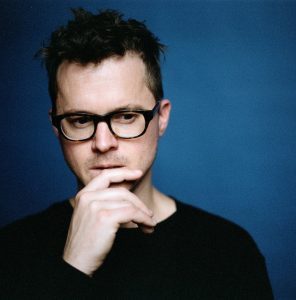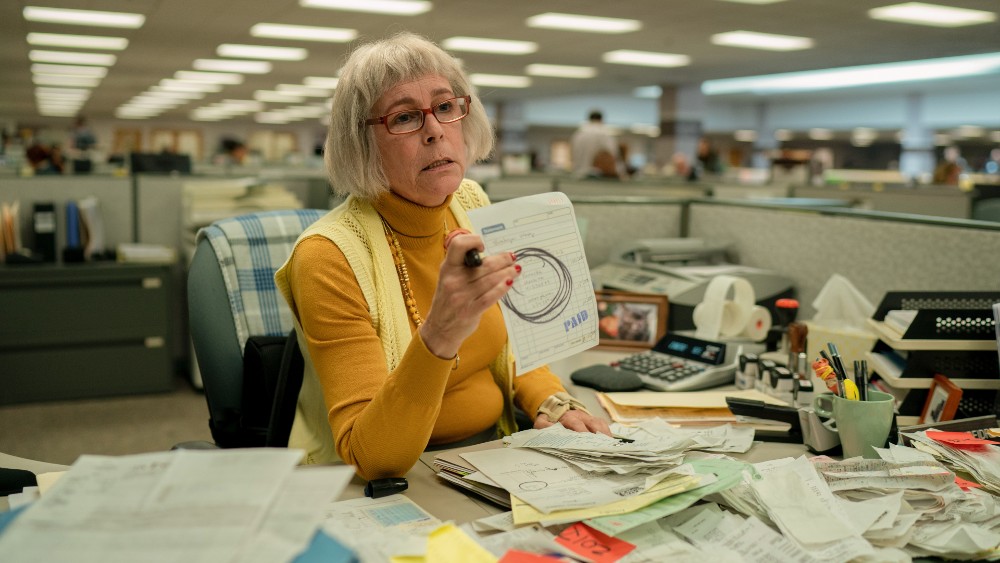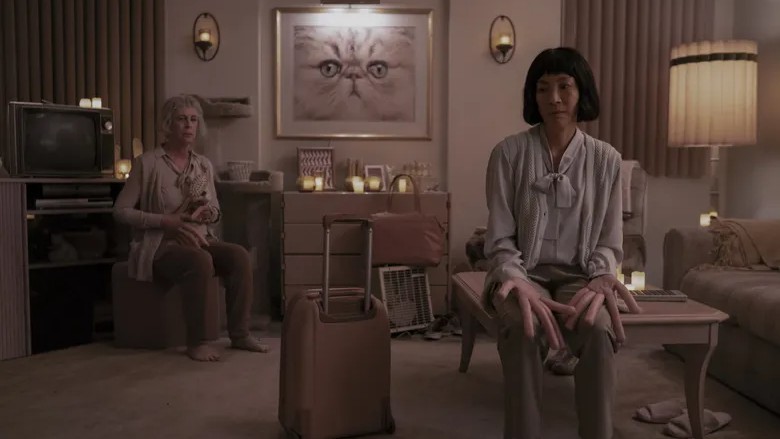At this point, there’s very little that needs to be written about Daniels‘ absurdist comedy Everything Everywhere All at Once, because the Oscars are less than a week away, and it seems likely that the A24 movie is going to do very well in many of the major categories.
One thing that hasn’t been written too much about is the film’s amazing score — a gorgeous piece of music by Son Lux that is highly experimental, much like the regular music by the trio, which is made up of Ryan Lott, Ian Chang, and Rafiq Bhatia. There’s really nothing else like Son Lux’s original score in the running this year, and the group’s work is also very different from the typical Hollywood scores we tend to hear, maybe because Son Lux didn’t approach it as most Hollywood composers would.
Below the Line had a chance to speak with Lott and David Byrne about their Oscar-nominated song “This Is A Life,” and you can click here to read that — but after Byrne signed off, we continued speaking with Lott for another 30 minutes to talk about crafting the EEAAO score with his Son Lux partners.

Below the Line: Did you know the Daniels beforehand or were you in some of the same circles?
Ryan Lott: No, they were just fans of our music as a band and also our music as individuals. We all have solo projects — Ian Chang, Rafiq Bhatia, and me — we all have our own records. They came to us, because they were making a multiverse movie, and they needed a multiverse band. They needed a family of creative folks [who] were not just Hollywood composer folks. This is our first time scoring anything together as a band.
BTL: You did another score for The Disappearance of Eleanor Rigby, so you just did that by yourself before the other two guys joined the band?
Ryan Lott: I’ve done three features by myself — Disappearance of Eleanor Rigby, which was a two-part film that [birthed] a third version [that was] just a single film. That’s with James McAvoy, Jessica Chastain, Viola Davis, William Hurt — an incredible cast — but kind of the easiest job in the world as far as a film score, because it was originally a three-hour, two-part film, and I think there were [just] seven cues. It was just, like, the opposite end of the spectrum from this movie.
That actually was one of the first collaborations I had with Rafiq Bhatia, who would go on to become my bandmate and a member of Son Lux. He helped me generate some raw sounds and things that I wanted to use to score that [film]. I also did Paper Towns, the [movie] adapted from the John Green book, and then a film called Mean Dreams, which is actually a really cool, small Canadian film.
I’d done those three, and I’ve done a ton of ad work as well, because when I was first developing the Son Lux project, I started working with a music house, writing music for ads. I was in Cleveland at the time, and they hired me and moved me to New York, and built me a studio. It was a really amazing place to cut my teeth [and] learn how to approach music from many, many angles, and learn how to do things that I never thought I would find myself doing — mashing up idioms and genres and getting deep inside of genre, and also learning, like, how to play other instruments better and write really, really fast. All of those things were necessary preparation for this film.
BTL: My early days in New York involved working on jingles as an engineer, and one of my early successes was the “Gimme a Break” jingle for Kit Kat.
Lott: Whooooooa. Those were the days when money was crazy into that stuff. When I was deep in it, things were really shifting. It was so, so competitive, which it always was, but the budgets were shrinking fast.
BTL: You’ve obviously worked with the other guys on a couple of Son Lux records now, and I think some of the others who worked on this movie have told me Daniels had almost finished shooting when COVID hit.
Lott: They had one more day of shooting, and they had to wait and do it with skeleton crews in different parts of the world. Fortunately, the very last day they had planned to be just pickups and green screen stuff anyway. I mean, it took, like, nine months, but they were able to do all the final scenes.

BTL: I assume you guys have always worked remotely anyway because you’re in different places but had you already started writing some music before Daniels began production?
Lott: Yeah, we did. That was another thing that was really unique about our role in the film — we really got to get our hands [and] our fingerprints on it really early, which is pretty rare, especially these days. A lot of times you’re just the icing on the cake, or you’re pulled in to be [the] fixer, emotionally and narratively. That was not at all the nature of our engagement. The nature of our engagement was an invitation from the Daniels to begin to dreamcast and throw sound and colors of noise against the wall or really, at them, and then let them respond.
We were prescoring as early as September 2019. They didn’t even shoot until mid-January. That was awesome because then they temped with our music. They temped with some of our prescore stuff, some of our existing discography stuff. We were really in there from the ground up. The fact [is] that pretty much every frame of this film is accompanied by our music. It proved to be essential that we were there, [and] not only that we were in there so early in the process, but this movie would have been very different if it were not for the pandemic. The way that the post-production horizon disappeared meant that all these possibilities came into the realm of possibility.
BTL: Are all three of you multi-instrumentalists or do each of you have specific roles or instruments that you focus on, such as drums or guitar?
Lott: We’re all multi-instrumentalists, but we all, for sure, have our focus instruments. One of the reasons why I really fell in love with these guys when we first met was, I had begun the Son Lux project as a solo project and did it for years. I made three records — six releases — but what really drew me to working with these guys [was] more than just [being] on stage [together]. I originally thought I just needed to form a live band. I was getting ready to tour properly for the first time and couldn’t do it without a real band, the way I wanted to.
I partnered with these guys because I knew that they were not making music through the lens of their instruments. They didn’t see music through such a limited… because you can have an amazing guitarist who just can play everything, and his ideas are incredible and chameleonic and stuff, but [he] still has that vantage point of just “the guitarist.” Neither of these guys had that. They had the opposite in spades,[in that] their minds were really open, and their ideas and their sensibilities didn’t have to pass through their instruments to to express themselves.
BTL: And how did the roles change once you were doing the score, which is a little different since you’re dealing with picture?
Lott: I’m a pianist, and so is Ian, but there were parts where Rafiq was doing the piano parts. A lot of what we did is, we would capture our own performances, and then one of the other members would actually harness that performance and be the one executing the idea in application. So it would be a drum performance by Ian, but then I would steal it, and I would slow it down or chop it up, or turn it into something that was an altered state version of itself, and then use it in the cue that I’m spearheading. And tons and tons of examples of that with guitar as well — developing a library, and not just of the instruments we play. We partnered with musicians, friends, vocalists, all kinds of stuff.
We developed a mountain of colors and timbres and sound potential, and it’s from that mountain that we drew to design virtual playable instruments that we could sculpt the score with. The score, no matter what, was going to be a hybrid of all kinds of things, but it was really, really important to us that as many of those things as possible be bespoke [and] handmade, just like the movie is, [given] how it was shot with so many practical effects. So many of the zany ideas, they just did in-camera. It’s akin to what I was just describing, which is to just build it from the ground up with your hands.
BTL: There’s a ton of orchestral stuff in the film as well. Was there a point where you had all the cues written and in some state before you went off somewhere to record the orchestral instruments? Could you even record in L.A. at that point?
Lott: One of the things that we were able to do before the pandemic [was] record a lot of the strings. Everything at that point was off-picture, so we worked with larger ensembles. So we could record three drummers at one time. It was back in the days when you could get people in the room together and record. Fortunately, we did have a bunch of that. We also developed a huge library. We did just one sampling day, but we rented a bunch of instruments, and we did so much tracking, and again, we sculpted later. A lot of the traditional orchestral instrumentation is meticulous programming with sample libraries. What made it really work for us was the hybridity that we established between those recognizable forces.
There are these action sequences that had specific action music [with] sci-fi music insinuations and vibrations, so we could counteract them with all these wild other instruments that we were designing, to actually merge with the traditional orchestration. Because it was all pandemic, there was no chance — and also, let’s face it — there was no money to make this movie. There was definitely no money to make the score. But we couldn’t let those limitations get in the way of our ambitions and what this film demanded, so everything was on the table. It was about just making the most of all the resources and allowing the limitations to be the vehicle by which we discover creative possibilities that otherwise, we would not have discovered.

BTL: Does one of you have a big enough studio to record three drum kits at once?
Lott: We were in residence at a studio, Red Bull, in Chelsea, which is now, unfortunately, closed. We were in big tracking rooms and were able to do that stuff. As far as our solo recordings, Ian lives in a house in Dallas, [so he] was able to do drum tracking and all sorts of noisemaking in his house. Rafiq is in Brooklyn and has tons of friends who are engineers, and we have good connections with small studios. We were able to dip in, mask up — one engineer, one performer — and make it happen, so that was really cool. I did an extensive sampling session with a friend of mine, Hajnal Pivnick, who’s a great violinist, so we were doing all sorts of wild string recordings with her. Just one-to-one in masks, and we were able to do it.
We work with what we have. The other thing is, the way we work as a band is quite different. When we’re just making records, it’s really different than the way a lot of folks work in that we record very, very early in the process rather than the last stage. Recording is part of the writing process because we track a lot of improvisation, but we also capture ideas very early and in raw form, before we allow things to settle. As such, we as a collective have a crazy amount of recordings that never made their way into songs. Because our resources were so limited on this film — not a big fee, we were sharing it, and we had to pay for everything for ourselves — so we had to be really creative. We also had that extensive library of previous sonic discoveries that we could draw from, tiny little raw materials to help us sculpt and settle ideas.
BTL: Once Daniels had a cut, how did you work with the film’s Editor, Paul Rogers? Did you just send them stuff and let them use it wherever it worked? This soundtrack is almost two hours long, and the movie is only a little bit longer than that.
Lott: It’s two hours and 12 minutes, and there’s an hour and 15 minutes of original music in the film. [In] the rock sequence, and the hallway sequence, where there’s the William Tell orchestra, there are little blips of recognizable music, and also the shot-for-shot recreation of 2001: A Space Odyssey‘s monkey scene. Those are the only things in the whole movie that don’t have our music. I think there’s maybe a seven-second stretch after the intro. Literally, it’s just non-stop, but one of the things that was really cool, and I think really unique about scoring this film and our collaboration with Paul and Kwan and Scheinert was, the Daniels come from music videos. This is their second feature, but they’ve always done shorts and music videos. The entire time they were extremely deferential to music in a way that you usually do not get. It’s usually like, “Okay, we had to move the picture around and do whatever it takes to make it still work,” which is a huge, huge part of the work in the art of film scoring — not [over]writing [and] not screwing up what was perfect originally, because the picture moves, and chasing an edit around.
I’m being overly dramatic and cynical about it because a lot of times in that process, you also make beautiful discoveries that you otherwise would not have made. That was the case in this movie, but there were so many key sequences, whether it’s fight sequences or just long montages of stuff, [and] they were always consistently saying, ‘Tell us if we need to move something around [or] if it doesn’t feel right because we really want it to feel musical. Just let us know if you need more time, like an extra beat here or something, so you don’t have to cheat the music at all. Let us know where, if we need to move the edit,” which is something a film composer never hears. We heard it again and again and again [here]. There were cues where Paul asked for click tracks so that they could really line the edit up right on the beat.
BTL: I speak to many composers — even some of the most seasoned ones — where chasing the edit is just something they have to deal with since things tend to be done a certain way.
Lott: A lot of times, that is the role. There was that, of course. There [was always] going to be that in this film, especially [with] as much music as there is. You get to a point with film scoring where a lot of that work is done by a Music Editor. But music editors are paid weekly, and when working backward from the film mix, and you’re in a global pandemic, and there is no plan for when this movie is going to come out, let alone when it’s going to wrap, you can’t hire a Music Editor. For almost [the entire] process of this film, we had no Music Editor, and folks who are in the industry and do film composing know how insane that is. Especially with this amount of music. We are doubly thankful — triply thankful — that Daniels were so deferential to music, because we would have just absolutely died if we were constantly chasing the edit on [this] thing.
BTL: Listen, the movie turned out great, and again, congratulations on the Oscar nominations. I think after the first time I saw the film, I saw that “some Son Lux guy” had composed the music, and had to find out who that was, and as it turned out, you ended up playing in Brooklyn maybe that same week. I was bummed that I missed it.
Lott: It was kind of a Covid-fest. That was when everybody was deciding, ‘Nah, we’re not gonna wear masks.’ It was toward the top of our tour, so it was a really good show, but it felt really crazy because it was like, “Oh my god, we’re really touring right now.” You can’t sing with a mask on, and you look out and there are 700-800 bodies in a single room, most of them not masked, and that hadn’t happened in so long. You missed a good show… but you also might have missed Covid.
Everything Everywhere All at Once is now streaming on Showtime Anytime, and it’s also available to buy or rent on all major VOD/digital platforms. Click here to read our interview with Lott and David Byrne regarding their Oscar-nominated song “This Is A Life.”





